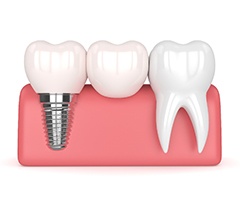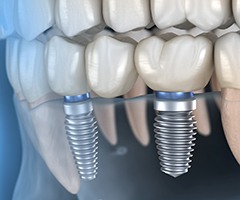Dental Implant Bridge
Bridging the Empty Space in Your Smile
If you are missing multiple teeth, you know all too well the struggles that come with an incomplete smile. You may find it difficult to eat a robust diet, and your gums may quickly become irritated. The gaps in your mouth may even cause you some embarrassment. Fortunately, you do not have to put up with such issues forever. At Blue Ridge Dental, we can use dental implants in Charlottesville to seamlessly fill in the gaps in your smile and help you regain full dental function.
Two Consecutive Missing Teeth

If you have two missing teeth in a row, we will likely just need one dental implant to replace both of them. The implant will go into your jawbone. Over a period of a few months, it will fuse to the tissue around it, a process that ensures it will provide the sturdiest base possible for your new teeth. Then, we will place a two-unit bridge on the implant. It will have one crown, which will go directly on top of the dental implant, and a pontic (artificial tooth), which will be supported by the crown.
Three or More Consecutive Missing Teeth

If you have three or more missing teeth in a row, your dentist in Charlottesville will likely place one implant at each end of the gap. Each implant will support a crown, and the crowns will hold 1 – 3 pontics between them. For patients who are missing more than five teeth in a row, we may need to use more than two implants to ensure that the new teeth have all the support they need to function at their best.
Multiple Missing Teeth Throughout an Arch

What if your missing teeth are not adjacent to one another but instead are spread out throughout a dental arch? You may still be able to take advantage of dental implants. We’ll carefully evaluate your oral health and recommend a treatment plan. It is possible that an implant-supported partial denture is the ideal solution to your tooth loss. This type of prosthetic may require just a few dental implants to provide you with sturdy, reliable function.
Benefits of Implant-Retained Bridges or Partial Dentures

Implant-supported bridges and partial dentures provide numerous benefits:
- A strong bite force. You will be able to enjoy virtually any food without worrying that your new teeth will become destabilized.
- Improved jawbone health. Dental implants stimulate the bone, helping to prevent the deterioration that typically occurs after tooth loss.
- No need to modify healthy teeth. A traditional dental bridge relies on the support of the remaining natural teeth; those teeth must be modified in order to fit beneath crowns. Implant-supported prosthetics are self-supporting, so they allow your natural teeth to retain their original shape.
- With proper care, dental implants have the potential to last for 30 year or longer.
Are you ready to learn more about dental implants and how they may be able to rebuild your smile? Contact us today to schedule a consultation or ask questions about our practice. We can’t wait to welcome you as a new patient!
Frequently Asked Questions – Implant-Retained Bridges & Partials

These days, patients who are missing multiple teeth have several options available to rebuild their smiles. More often than not, though, we will almost always suggest a solution that involves dental implants in Charlottesville. Dental implants allow us to replace your lost teeth with sturdy, powerful, and long-lasting prosthetics. To help you understand what to expect when you choose an implant-retained bridge or partial denture, we’ve compiled and answered some of the questions we get asked the most often on this subject.
Am I a Good Candidate for an Implant-Retained Bridge or Partial?
Fortunately, most patients who are missing more than one tooth make good candidates for an implant-supported solution. Of course, you should have enough healthy jawbone mass to support dental implants. However, if that is not the case, don’t worry. You may just have to undergo a bone grafting procedure first to strengthen the jawbone.
The ideal dental implant candidate should also be free from tooth decay and oral infections like gum disease. We also suggest that you avoid tobacco and keep up with a proper oral hygiene regimen.
How Do I Take Care of My Implant-Retained Bridge or Partial?
For the most part, maintaining an implant-support prosthetic is not all that different from caring for natural teeth. Daily brushing and flossing will go a long way in preventing plaque from building up and compromising your implants. Some patients may have difficulty flossing the area in between a bridge and the gums. If that’s the case, we can recommend products that may help, such as a floss threader or water flosser.
You should also keep up with your routine dental checkups and cleanings. These appointments allow your dentist in Charlottesville to not only clean your remaining teeth, but examine your implants for any issues. The sooner we detect a problem, the easier (and more cost-effective) treatment will be.
How Much Do Implant-Retained Bridges & Partials Cost?
The cost of replacing your missing teeth can vary greatly depending on a number of factors, such as the materials used, the number of implants you require, and the complexity of your procedure. As a result, the only way we can give you a cost estimate is if you visit us for a consultation.
While dental insurance often does not cover the cost of dental implants themselves, they will often pay for a portion of your restoration. At Blue Ridge Dental, we are in-network with many insurance plans, including Guardian, Cigna, and Aetna, and we’ll gladly examine your plan to help you maximize your available benefits. Alternatively, we offer an in-house dental savings plan that gives you discounts on most of our services, in addition to FREE preventive care.
